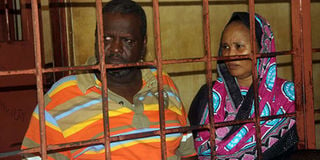Worrying trend as women get sucked into drug trade

Suspected heroin traffickers Swaleh Yusuf (left) and Asmah Abdalla arraigned in Mombasa on February 21, 2017. More women are being drawn into the business. PHOTO | FILE | NATION MEDIA GROUP
What you need to know:
- Ms Fatma Ahmed was arrested in Nairobi’s Eastleigh estate last year after a manhunt by anti-narcotics detectives. She was linked to 92 kilograms of heroin.
- A UN report noted that women were getting sucked into narcotics business to sustain their own drug consumption.
Ordinarily, one would expect a 62-year-old grandmother to be at home looking after her grandchildren and regaling them with historical tales.
But this was not the case for Ms Salma Bakari Ali, who was recently arraigned in a Shanzu court, Mombasa, charged with being in possession of heroin valued at Sh3 million.
Ms Ali had been arrested in her house in Mlaleo, Kisauni constituency.
Her arrest points to a sharp rise in the number of women who have been arrested in connection with drug trafficking, especially at the coast.
It is now emerging that women are fast getting involved in narcotics trade, previously the domain of well-established and deeply connected male drug lords, if recent arrests are anything to go by.
Ms Ali was arrested alongside another Ms Zainab Abdi, who was found with Sh98,500 in cash that police suspect were proceeds of the illegal, but highly lucrative, trade.
Ms Abdi, 40, was also charged alongside Ms Ali and released on a Sh500,000 bond or a cash bail of Sh200,000. The hearing date is set for May 16.
ARRESTS
Sources within the anti-narcotics department confided in the Sunday Nation that the two women are linked to a drug baron who was once arrested, convicted and sentenced to a 15-year-jail term.
The drug lord later appealed and was set free after serving only three years in jail.
The arrest of the two came a week after another woman, Ms Cynthia Achieng’, was arrested at her house in Shanzu with bhang worth more than Sh500,000.
Three bags containing 1,705 rolls of bhang were seized from the house during a sting operation by police officers.
Ms Achieng’, 45, caused drama at the Central Police Station in Mombasa’s Central Business District after she refused to be paraded before the media by pretending to have fainted as police prepared to brief the public over the seizure.
Mombasa police boss Johnston Ipara said Ms Achieng' was out on bond over another case of drug trafficking.
“The bhang that was recovered is from Migori County. We are following leads to ensure that we arrest others who are involved in this business that is ruining our innocent children,” said Mr Ipara.
HUGE HAUL
Also on the list of women who have been arrested over drug trafficking is the wife of suspected drug baron Swaleh Ahmed Yusuf, alias Kandereni.
Mr Yusuf is facing several drug related charges in Mombasa courts.
His wife, Ms Fatma Ahmed, was arrested in Nairobi’s Eastleigh estate last year after a manhunt by anti-narcotics detectives.
She was linked to 92 kilograms of heroin with an estimated street value of more than Sh300 million seized in a house in Kikambala on September 20 last year. The drug haul was among the biggest in the country.
Police said Ms Ahmed was the manager of the Kikambala home where the heroin was found. At the time of her arrest, Ms Ahmed was operating an M-Pesa outlet in Mombasa.
She was charged alongside Mr Yusuf with trafficking in drugs. Their case is ongoing in Mombasa.
EXPLOITATION
Police attributed the rise in the number of women arrested in connection with narcotics trade to intensified crackdown on established drug lords at the coast, who are now resorting to using women to move the drugs.
“We are not going to sit down and see people doing drug business and ruining our future generations. We will deal with them irrespective of their gender or age,” said Mr Ipara.
A 2018 report by the United Nations Office of Drugs and Crime titled “Women and Drugs; drug use, drug supply and their consequences” reveals that of the people arrested for drug-related offences in 98 countries between 2012-2016, some 10 per cent were women.
The report noted that women were getting sucked into narcotics business to sustain their own drug consumption but, in some cases, some women involved in trafficking in drugs were victims of trafficking in persons, including trafficking for the purpose of sexual exploitation.
“Women’s participation in the drug supply chain can often be attributed to vulnerability and oppression, where they are forced to act out of fear. Moreover, women may accept lower pay than men,” the report said.
Another narrative argued that women might be empowered key actors in the drug world economy.
“Cases have also been documented in which women are key actors in drug trafficking, by choice.
"Overall, although a multiplicity of factors are behind the participation of women in drug trade, it has been shown to be shaped by socioeconomic vulnerability, violence, intimate relationships and economic considerations,” the report added.




